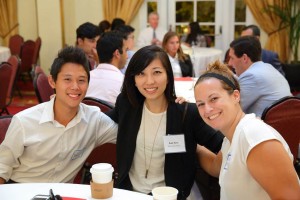Alumni startups take off
Mastering the Five Traits of a Trojan — faithful, scholarly, skillful, courageous and ambitious — supposedly produces the ultimate USC student. But student and professional alumni entrepreneurs argue that these qualities create more than just the ideal student — they create innovators.

Mentoring success · Suzy Ryoo (center), graduated from the Marshall School of Business in 2009. Her start-up LK3 recently received full funding from Kickstarter to produce a line of zip-up dress shirts for men. – Photo courtesy of Suzy Ryoo
Two young USC alumni entrepreneurs especially embody these characteristics. Amarelle Hayes, a graduate of USC Annenberg School for Communication and Journalism, started a chocolate company after graduation, and Suzy Ryoo, an alumna of USC Marshall School of Business, developed a zippered dress shirt as part of her startup.
Ryoo’s company LK3 was recently fully funded thanks to the company’s Kickstarter campaign. The LK3 Kickstarter will close this Thursday, and the LK3 zippered dress shirt will be available for pre-order the following day.
As an alumna, Ryoo said she believes the Trojan lifestyle fosters amazing entrepreneurs since Trojans are taught to be faithful, and to honor the Trojan family.
“At USC, there is a general spirit of one community,” Ryoo said. “With the USC alumni network, Trojans with innovative startup ideas have the resources and support system to launch their vision.”
Ryoo describes this idea of helping each other through the Trojan network as a cycle of circular repetition. She said when students are beginning their college careers and searching for that initial sense of purpose, the Trojan network helps guide them in the right direction.
Once they graduate and realize their ambitions, the USC culture encourages them to give back, like Ryoo does.
“USC gave me the launching pad to build my startup,” Ryoo said. “After graduating, I have only felt a really strong urge to go back and do more.”
Ryoo was the youngest mentor in the Marshall Career Advantage Program. She said she gained so much from her mentors as a student that she was eager to return the favor.
“I was so passionate about the [USC] community, and I think that was in my blood,” Ryoo said. “Now I love still being really active in the Trojan network.”
Ryoo considers her startup, LK3, an interdisciplinary design collective that serves as a cross section of “advertising, technology and new media.” Her first product is a reinvention of a men’s traditional button-down dress shirt that she hopes will create a new staple in the fashion market.
She said that the interdisciplinary approach to education USC encourages among their scholarly student population has influenced her business strategies.
Hayes, a graduate of the Annenberg School for Communication and Journalism, used her culinary skills to spark her own business endeavor: a chocolate company.
After taking classes through her entrepreneurship minor, she created the chocolate company, Chic Choc by Amarelle.
Hayes said she believes the USC culture fosters entrepreneurial thinking because of the ambitious drive among college students, but she said she is hesitant to call it something unique to USC.
“I don’t know if it is necessarily a ‘Trojan trend’ since, in general, entrepreneurship is becoming more enticing for young crowds,” Hayes said. “Startups are a common result of the mixing of smart, innovative and honestly, wealthy students.”
Hayes said the Lloyd Greif Center for Entrepreneurial Studies through the Marshall School of Business helped her master her business skills to produce a successful product. The faculty of the Greif Center includes both academics and professional entrepreneurs who provide guidance based on academic theory and their helpful “real world” experience.
Ryoo agreed that being around other ambitious students encouraged her to eliminate her self-doubt and implement her creative inspiration into her first concrete prototype that later grew into her LK3 company.
“You see other people doing well and you see other people exploring,” Ryoo said. “I think that sense of community is empowering.”
Ryoo said that when she was a student, her group of entrepreneur friends would meet once a month for what they called “mastermind dinners.” They would listen to one another’s startup ideas and provide constructive criticism.
“At one ‘mastermind dinner,’ I literally brought an early prototype of the product I now have developed and had other ‘masterminds’ try it on and give me really helpful feedback,” Ryoo said. “Then, we had no idea what it would be today, but it helped me build my entrepreneurial mindset through the help of other students.”
Hayes said the final quality embodied by both entrepreneurs and Trojans is courage.
“The drive is there for many people,” Hayes said. “Now, it’s a matter of getting out there and doing it.”
Follow Christina on Twitter @christinasarena
